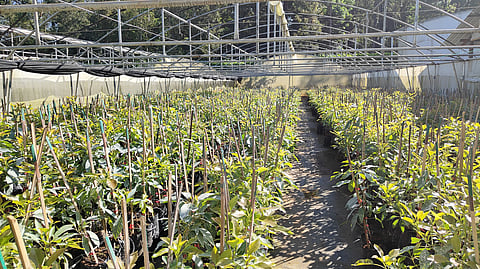
- LIFESTYLE
- FASHION
- FOOD
- ENTERTAINMENT
- EVENTS
- CULTURE
- VIDEOS
- WEB STORIES
- GALLERIES
- GADGETS
- CAR & BIKE
- SOCIETY
- TRAVEL
- NORTH EAST
- INDULGE CONNECT

Coorg, one of the smallest Province in British India, with an area of about 1,582 square miles, has always been a land of prospects for rulers and explorers alike. Nestled in the heart of Western Ghats and inhabited by Kodava tribes since time immemorial, Coorg, or Kodagu in Karnataka, is rich in natural resources, attracting traders for its variety of spices. With the advent of the British in the 19th century, coffee plantation was introduced on a commercial scale alongside the prevalent spice cultivation, spurring further economic activity in the region which is also known as the Scotland of India. Coorg’s temperate climate, hilly slopes, and conducive soil quality offered the British a veritable ground for coffee cultivation, turning the sleepy settlement into one of the leading coffee-growing spots in the country. And now, the beautiful region is witnessing yet another economic churning with the commercial plantation of the prized avocados.
The fruit, which has its origins in the Americas, requires the same set of weather and soil parameters as coffee to grow its finest. The abundant growth of the local variety of West Indian avocados for ages made Coorg a great option to further explore for growing other variants of avocados commercially. One of the first companies to sense that was Westfalia Fruit, which in collaboration with Sam Agri and Dvori-Or Nursery, has forayed into the region to grow Hass avocados, one of the best varieties of the fruit that’s sought after globally. Now, you can have the best avocados grown locally, saving you of the guilt of causing carbon footprints.
To know more about the alligator pear, we went on an avocado trail, at one of their state-of-the-art nursery and farms in Coorg. As we meandered up the hilly forest track in our mini traveller, to reach the old colonial Cottabetta Bungalow, our home for the next two days, we were greeted by an elephant family, a couple of deer and a snake on the way. Rejuvenated after a local Coorgi breakfast, we geared up for an amazing day trip to avocado farms to get to know the fruit up close and personal. We hardly knew anything about the exotic fruit till then, apart from the fact that the leather-skinned fruit, with a buttery texture and rich nutty flavour, is packed with vitamins, fibres, healthy fats, antioxidants and other vital nutrients, making it good for our eyes, skin, heart, brain, bones, and prostate. The reason Hass Avos are preferred to the local West Indian variety is that the latter is neither rich in good fat (which makes it less creamy in consistency) nor does it have a long shelf-life. As we visited the Westfalia farms, we were amazed to witness how they grow clones of the best Hass breed under strict supervision, right from planting to harvest.
The Coorg nursery focuses on cultivating selected rootstock, clonal, and commercial planting material to grow top-tier Hass and other commercial avocado varieties. The tedious clonal process takes 10 lengthy steps covering more than 18 months—right from seeding to getting the plants ready for transplantation. Thereafter, the transplantation process takes another nine months before the plants are ready for despatch. Currently, with over 500 acres of avocado plantations across India under Westfalia’s supervision, they have 50 per cent of the market share and plan to surpass 1,000 acres by 2026. With sustainability a concern now, more than ever, Westfalia together with the World Avocado Organisation (WAO) is enhancing consumption awareness, scaling production, and establishing robust supply chains. As a diversification crop for tea and coffee growers, avocados provide sustainable income opportunities to the local farmers too. Additionally, India’s northern hemisphere seasonality complements African and South American avocado seasons, presenting lucrative opportunities for both domestic consumption and exports. WAO has spearheaded numerous initiatives to spread avocado awareness and has played a pivotal role in fostering India’s growing love for the superfruit. Dedicated to sustainability, it is enabling farmers to adopt eco-friendly methods that reduce water and carbon footprints, preserve biodiversity, and ensure long-term farming viability in the face of climate change. With so much knowledge in hand, we braced up to taste the goodness of the fruit and had a deliciously creamy and lip-smacking bowl of avocado smoothie. The smoothie was so tasty and wholesome that we thought of getting the recipe for our readers too.
Avocado smoothie:
Ingredients: 1 avocado | half banana (optional) | 3 tbsp honey | 1 cup chilled milk | 1 tbsp dry fruits chopped | 1 tsp honey
Method:
Blend avocado with half a banana and honey.
Add the cup of chilled milk and blend. Add more milk if required.
Pour in a tall glass, drizzle 1 tsp honey, and add chopped mixed nuts to relish the goodness.
Know your avos
Here’s your guide to Hass Avos
Keep them at room temperature until ripe.
Unripe: Firm to touch, not ready yet.
In process: Becoming softer, ripening continues.
Ripe and ready: Yielding to gentle pressure.
To speed up ripening, store them close to bananas. Once ripe, store them in refrigerator.